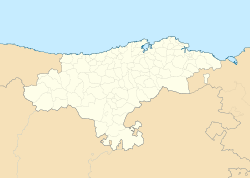
Cantabria is an autonomous community in northern Spain with Santander as its capital city. It is recognized as a historic community and is bordered on the east by the Basque Autonomous Community, on the south by Castile and León, on the west by the Principality of Asturias, and on the north by the Cantabrian Sea.
Asturias, patria querida is the official anthem of the autonomous community of Asturias, in Spain.
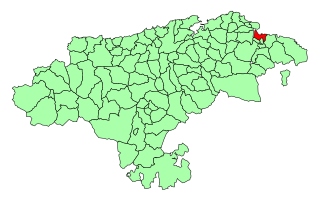
Laredo is a town in the autonomous community of Cantabria. According to the 2008 census (INE), the municipality has a population of 12,648 inhabitants. In addition to Laredo, the municipality includes the villages of La Arenosa, El Callejo, Las Cárcobas, Las Casillas, La Pesquera, Tarrueza and Villante. Except from the last two, the other villages had been physically integrated into Laredo.
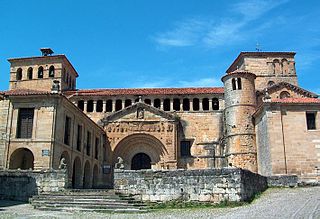
Santillana del Mar is a historic town situated in Cantabria, Spain. Its many historic buildings attract thousands of holidaymakers every year.
A parador, in Spain and other Spanish-speaking countries, is a kind of luxury hotel, usually located in a converted historic building such as a monastery or castle, or in a modern building with a panoramic view of a historic and monumental city. Parar means to stop, halt or stay.

The Regionalist Party of Cantabria is the second oldest political party in the Spanish Autonomous Community of Cantabria. The PRC originated in the Association in Defense of the Interests of Cantabria (ADIC), founded on 14 May 1976, with the objective of promoting Cantabrian autonomy.

The Battle of Santander was a battle fought in the War in the North campaign of the Spanish Civil War during the summer of 1937. Santander's fall on August 26 assured the Nationalist conquest of the province of Santander, now Cantabria. The battle devastated the Republic's "Army of the North"; 60,000 soldiers were captured by the Nationalists.

Valles Pasiegos is an administrative comarca in Cantabria, Spain. It is formed by the valleys of the Pas and Miera rivers, each one being a natural comarca of its own.

Entrambasaguas is a small municipality located in the autonomous community of Cantabria, Spain, 25 km south of the Bay of Santander. It is moderately mountainous, and the origin of the Aguanaz River, which once drove 23 watermills and merges with the Miera River. Limestone caves with Paleolithic rock art and burial sites from the Bronze Age exist. Iron was mined here from prehistoric times, used in the Royal Artillery Factory of La Cavada, which supplied the Armada, and eventually brought some wealth during the Renaissance. First mentioned in 1210, this rural area of Green Spain consists of six towns an area of 43.2 square km, totaling about 5,000 inhabitants as of 2015, having nearly doubled since 2005.

Guriezo is a municipality located in the autonomous community of Cantabria, Spain. According to the 2013 census, the town has a population of 2,424 inhabitants. Its capital is El Puente.
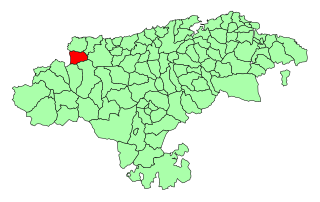
Herrerías is a municipality located in the autonomous community of Cantabria, Spain. According to the 2007 census, the city has a population of 715 inhabitants.

Luena is a municipality located in the autonomous community of Cantabria, Spain. According to the 2007 census, the municipality has a population of 831 inhabitants. Its capital is San Miguel de Luena. The municipality consists of a valley which runs from the Cantabrian Mountains to the North, until it reaches the valley of the river Pas. It is a markedly rural area, where the traditional economic activity evolves around the cow.

Puente Viesgo is a municipality in Cantabria, Spain. Caves have been discovered near Puente Viesgo that contain rock art and artefacts dating back to the Middle and Upper Paleolithic.
El Puente, meaning "The Bridge" in Spanish, may refer to:
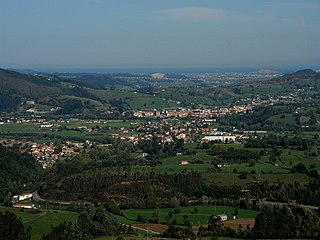
Santa María de Cayón is a municipality in the province and autonomous community of Cantabria, northern Spain. According to the 2020 census, it has a population of 9,167 inhabitants.

Santiago Metro Line 2 is one of the seven rapid transit lines that currently make up the Santiago Metro network in Santiago, Chile. It has 22 stations and 20.7 km of track. The line intersects with Line 1 at Los Héroes, with the Line 3 at Puente Cal y Canto, with Line 4A at La Cisterna, with Line 5 at Santa Ana, and Line 6 at Franklin. It will also intersect with the future Line 7 at Puente Cal y Canto. Its distinctive colour on the network map is banana yellow.

Suances is a municipality in Cantabria Province, Spain.

Rasines is a municipality located in the autonomous community of Cantabria, Spain.



